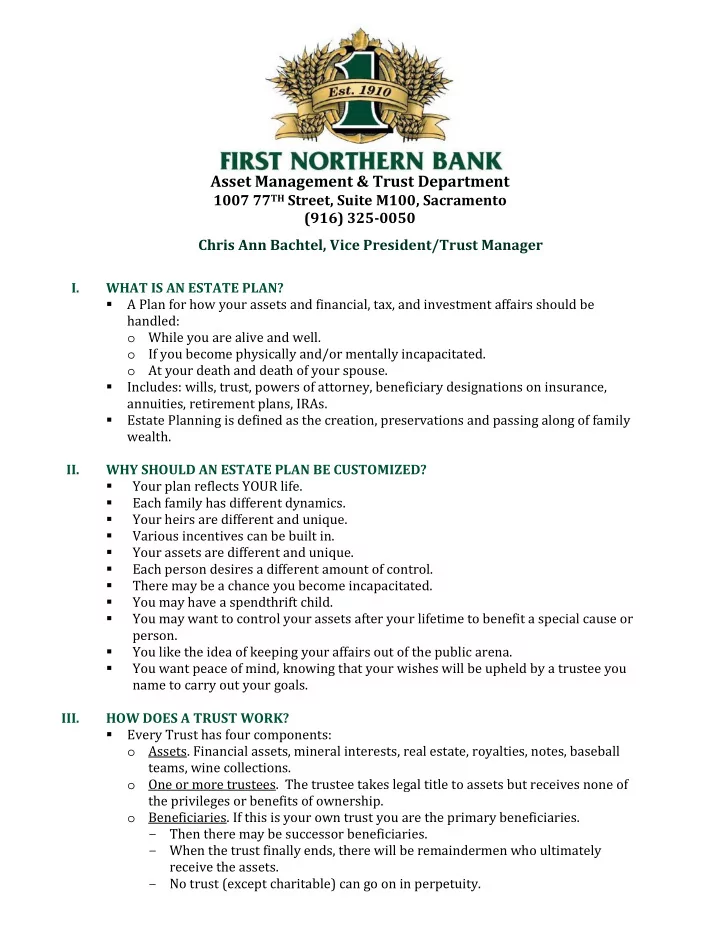

Asset Management & Trust Department 1007 77 TH Street, Suite M100, Sacramento (916) 325-0050 Chris Ann Bachtel, Vice President/Trust Manager I. WHAT IS AN ESTATE PLAN? A Plan for how your assets and financial, tax, and investment affairs should be handled: o While you are alive and well. o If you become physically and/or mentally incapacitated. o At your death and death of your spouse. Includes: wills, trust, powers of attorney, beneficiary designations on insurance, annuities, retirement plans, IRAs. Estate Planning is defined as the creation, preservations and passing along of family wealth. II. WHY SHOULD AN ESTATE PLAN BE CUSTOMIZED? Your plan reflects YOUR life. Each family has different dynamics. Your heirs are different and unique. Various incentives can be built in. Your assets are different and unique. Each person desires a different amount of control. There may be a chance you become incapacitated. You may have a spendthrift child. You may want to control your assets after your lifetime to benefit a special cause or person. You like the idea of keeping your affairs out of the public arena. You want peace of mind, knowing that your wishes will be upheld by a trustee you name to carry out your goals. III. HOW DOES A TRUST WORK? Every Trust has four components: o Assets. Financial assets, mineral interests, real estate, royalties, notes, baseball teams, wine collections. o One or more trustees. The trustee takes legal title to assets but receives none of the privileges or benefits of ownership. o Beneficiaries. If this is your own trust you are the primary beneficiaries. - Then there may be successor beneficiaries. - When the trust finally ends, there will be remaindermen who ultimately receive the assets. - No trust (except charitable) can go on in perpetuity.
o Instructions. These tell the trustee how to manage the assets and distribute the income and principal for the beneficiaries. The instructions may be broad, giving trustee great latitude (or discretion) or they may be very specific. The core of many estate plans is a trust document. It states what will happen to the family’s assets: - While all are alive and well. - When one or both spouses become incapacitated and can no longer handle their affairs. - When the first spouse dies because, depending on tax legislation, there is some very important tax planning that must occur. - When the second spouse dies. - Whether the trust should continue on after the lifetimes of those who created it. Many people don’t even know if their trust terminates or continues. - The trust can cover everything from: • Finances. • Investments. • Gifting of cash or assets to family or charity. • Bill paying. • Medical insurance claim reconcilement. • Business continuation. • Succession planning. • Tax planning. - Because of the way trusts are written many of these things can continue after the lifetime of the person creating the trust so in essence that person is controlling from the grave. IV. WHO SHOULD BE NAMED AS TRUSTEE? As you can see a great deal of responsibility falls on the named trustee. Therefore, choose your trustee carefully. Consider: The Role of the Trustee: o To carry out the terms of the trust. o Invest and manage assets. o Manage a family business. o Collect interest, rents, and royalties. o Manage real estate. o Make gifts. o File tax returns. o Pay bills. The burdens imposed should you choose one of your children (let’s say the oldest) to dole out the money and make discretionary decisions for siblings. The time involved. Find someone who has the time, energy, dedication, and expertise to handle the myriad roles a trustee must play. REMEMBER THAT ENTIRE BOOKS HAVE BEEN WRITTEN ON THE SUBJECT OF PROBATE AND TRUST ADMINISTRATION. Someone who will be there when you need them and stay around for a while. Consider that a person with no or little experience will need to hire accountants, investment managers, bookkeepers or secretarial assistance, property managers. Consider naming more than one trustee, perhaps a family member who can be attentive to the family dynamics and personal aspects of decision-making and use of trustee discretion and a professional trustee charged with proper investments, regulatory compliance issues and ultimate responsibility to uphold the terms of the trust.
V. WHY IS GOOD ESTATE PLANNING SUCH HARD WORK? Wealth is a responsibility. It forces you to think differently than you have before: new and challenging concepts. You must work with a variety of professional advisors. You must decide who will carry out your wishes at the exclusion of others. You are planning for the unknown. Getting children involved? It depends... VI. MISTAKES PEOPLE MAKE They fail to do their estate planning in the first place. They go to the wrong attorney. They don’t clearly or correctly express their wishes... clear directives to the trustee. They don’t understand their trust. (Some people don’t know when they end.) They don’t update their trust. They don’t discuss matters with their family members. They have inconsistent beneficiary designations on life insurance, J/T accounts, IRAs, annuities. They fail to put assets into a trust. VII. WHAT ARE IMPORTANT CONSIDERATIONS AT THE END OF LIFE? Review your existing plan to be sure it is up to date. Has your trust been funded? Younger Spouse? How healthy are your children’s marriages? Durable Power of Attorney for Financial Matters - What does it cover? Are those named to carry out your wishes appropriate? Do you have Digital Assets? “Your Digital Afterlife” by John Romano. Do you fully understand what your plan says and what will happen? Investments Not FDIC Insured May Loose Value No Bank Guarantee Rev. 3/13
Recommend
More recommend